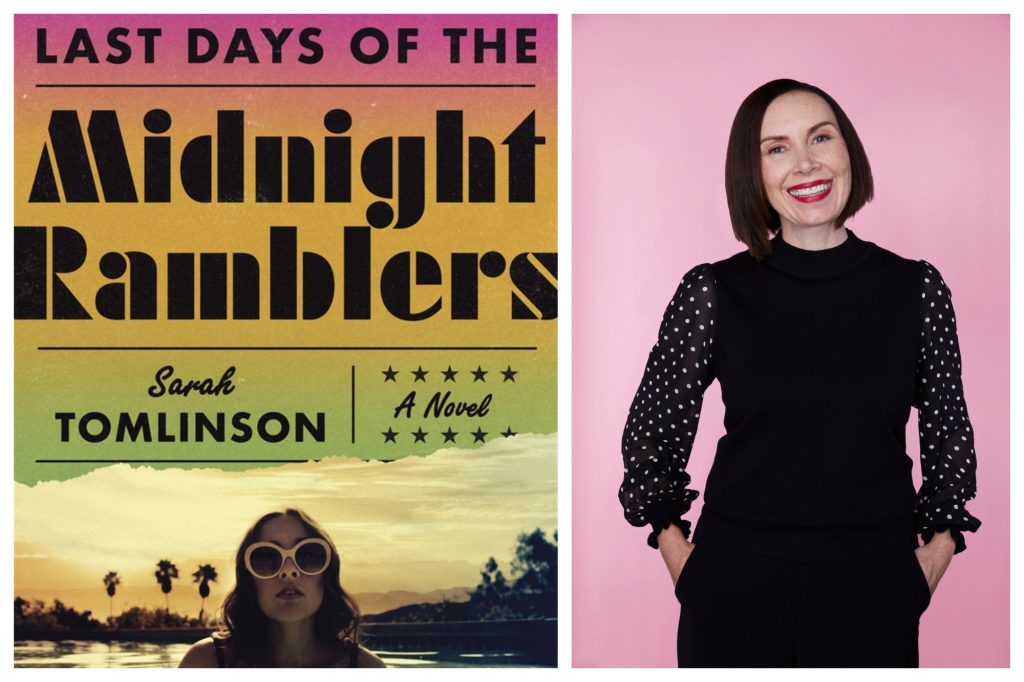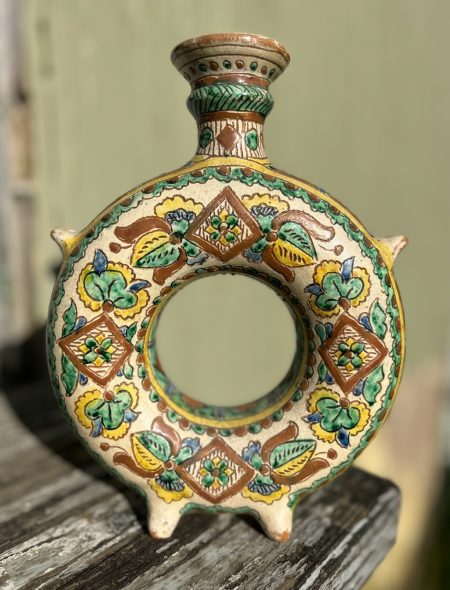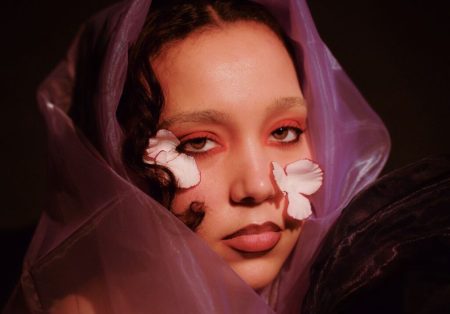Curious about being a ghost? Check out Sarah Tomlinson's first book to find out.
We're not talking about the ghosts that are said to haunt houses. Tomlinson's ghost is the publishing industry's workhorse – a ghostwriter, the unnamed, well-paid but often hidden writers hired to do the actual writing for those celebrity memoirs or the blockbusters credited to business moguls.
Tomlinson is familiar with this world: This L.A.-based writer is a well-known “ghost” in publishing circles, having ghostwritten or co-written 21 books, including the New York Times bestseller “Fast Girl,” with Suzy Favor Hamilton, and four other New York Times bestsellers for which she was uncredited. Tomlinson began her career as a journalist and became a popular music critic and columnist for outlets like Spin, Billboard and the Los Angeles Times (hence her social media handle, @duchessofrock).
In her first novel, “The Last Days of The Midnight Ramblers,” Tomlinson draws on her years of experience as a ghost and a music journalist to create a gripping drama about a desperate ghostwriter named Mari hired to write the memoir of a rock ’n roll courtesan who had a front-row seat to life with The Midnight Ramblers, a legendary, epic rock band in the vein of the Rolling Stones, The Beatles, and The Who. The death of the band’s charismatic leader Mal has only added to their legend. In trying to balance keeping her ghostwriting gig while also delving into the mystery of Mal’s death, Mari falls into a twisted world of fame and power, where nothing is really what it seems.
Tomlinson will appear on Friday’s episode of Bookish, the Southern California News Group’s free virtual program about authors and the literary life, starting at 5 pm. Register here. Before the program, she corresponded over email about the novel and her career. The conversation has been edited for clarity.
Q. Your novel provides the most insightful representations of the job of ghostwriting I’ve ever seen. It made me curious; you’ve had such a successful career doing it. How did you fall into this specialty, and what kept you in the role through so many books?
It’s very accurate to say I “fell into” this job. In the early aughts, I had established a successful career as a music journalist, mostly for daily newspapers like The Boston Globe and The Los Angeles Times. But after moving to Los Angeles in 2006 and feeling the effects of freelance budget cuts, I knew I needed to diversify my writing skills.
A friend-of-a-friend was up for a ghosting project for reality TV star Tila Tequila, and it ended up getting passed to me. I found Tila to be professional and was honored to have the chance to publish a book, and we worked with an excellent editor, Brant Rumble, at Scribner (an imprint of Simon & Schuster). So, I had a very positive experience and learned a great deal about book publishing. My agent came to me through that job, and he began finding me other ghosting projects. Like my ghostwriter character, Mari, who was loosely based on me, I found I was particularly well-suited to the work, in terms of the intimacy it requires in the inner life and creative process of clients, and the fast metabolism of the deadlines, which can often involve writing several books in a year. In between ghosting projects, I was able to buy myself time to work on my own fiction, screenplays, and personal essays.
You attribute the idea for Mightnight Ramblers to your agent Kirby Kim in the acknowledgments. Did you not have an interest in writing fiction before?
I had wanted to write fiction since I was 16 and took my first creative writing class at the early college Simon’s Rock. I went to journalism school in my 20s as a trade that was an alternative to waitressing. Kirby had read my three earlier novels and didn’t feel he was a good fit to represent them, or that they were right to be my debut. Knowing fiction was my first love, he gave me his blessing to show them to other agents and editors. For a variety of reasons, none of them found a route to publication. In 2016, over drinks in New York, Kirby suggested I should write a thriller about a ghostwriter because he knew all of my crazy, secret stories from the job, which I would never be able to tell unless I fictionalized them.
Like many people, it takes me a while to heed good advice, but I finally saw the wisdom of his words and started writing in 2018. One of the first questions was, what kind of memoir would my ghostwriter pen? And as soon as I decided to set it in my old world – rock ‘n’ roll – the whole book came together.
You might have noticed that the (weird) world of publishing has been featuring prominently lately, such as in the movie “American Fiction” and novels “Yellowface” and “The Other Black Girl.” What for you makes it an interesting backdrop for storytelling?
I loved all of those stories (and I chose my wonderful audiobook narrator, Helen Laser, in part because I adored her narration of “Yellowface” so much.) Not to make it seem like Kirby is my puppet master, but he and I spend a great deal of time thinking and talking about what makes fiction work, and he had the astute observation that readers (and viewers) love to learn about a whole new world.
These stories can be intriguing for those of us who work in media because they're familiar, but for readers, it’s an exciting opportunity to learn about all of the behind-the-scenes drama. I also love coming-of-age stories, and I feel like most author characters go through some version of losing their innocence and achieving greater wisdom (or at least perspective on life), while in pursuit of their deepest dream, which is the stuff of great drama.
Is this your first novel? Your memoir, “Good Girl,” was published in 2015, and you’ve written successful books for others. How did writing the novel challenge you?
To avoid any backlash from other writers, I usually don’t get blocked when I’m writing, even for myself. The years when I literally wouldn’t eat if I didn’t hit my journalism deadlines has given me an ingrained discipline that was very helpful when I faced my own creative work, especially on days when I felt anxious about whether or not it was any good.
I’ve always been drawn to character-driven stories (that’s really what most celebrity memoirs are, isn’t it?). So, that aspect of my novel was the easiest and most satisfying for me to write. I struggled the most with the plotting of the book’s mystery, as this is a new genre for me. I was lucky enough to have an excellent thriller mentor in the form of my friend Steph Cha, the author of “Your House Will Pay” I spent a lot of time revising the pacing, clues, and resolution of the book's mystery, which revolves around the drowning death of Mal Walker, a founding member of Midnight Ramblers. Anke, who was married to him at the time of his death, is a central figure in her memoir.
How does it feel to publish under your own name?
I've wanted to publish a novel for 30 years and I am very passionate about the novels that have inspired me, from “The Secret History” by Donna Tartt to “Tomorrow, and Tomorrow, and Tomorrow” by Gabrielle Zevin. “Tomorrow, and Tomorrow, and Tomorrow” by Gabrielle ZevinI wanted to write a book that could hold its own among my favorite writers, and also explore the essence of humanity.
I had to adjust my expectations for book promotion, as my experience would be different from that of my clients who are usually featured in high-profile ways.
I feel lucky to be able to answer thoughtful questions about my work, unlike other authors who may not get the same opportunity.
In “The Last Days of the Midnight Ramblers”, the protagonist, Mari, learns valuable lessons while delving into the glamorous world of fame and investigating the band's mystery. My experiences as a ghostwriter and music journalist greatly influenced the novel and my personal life.
I wanted Mari's clients to be extraordinary individuals who could teach her and the reader how to live a remarkable and authentic life. My belief in the possibility of such a life comes from the musicians, writers, and artists I have encountered.
Rock stars are admired for their rejection of a conventional life. I, too, have lived an unconventional life and sought inspiration from musicians and artists who embody curiosity, passion, original thinking, and creative discipline.
Q. Last question: What are your future writing plans?
I was lucky enough to have sold two novels to Flatiron Books, so I am collaborating with my talented and kind editor Zack Wagman on my next book, “Occupancy.” It’s a mystery that takes place at an Airbnb in the Pacific Northwest. I'm also continuing to ghostwrite and work on my own original screenplays, and I hope to get the chance to adapt “The Last Days of the Midnight Ramblers” for the screen.









